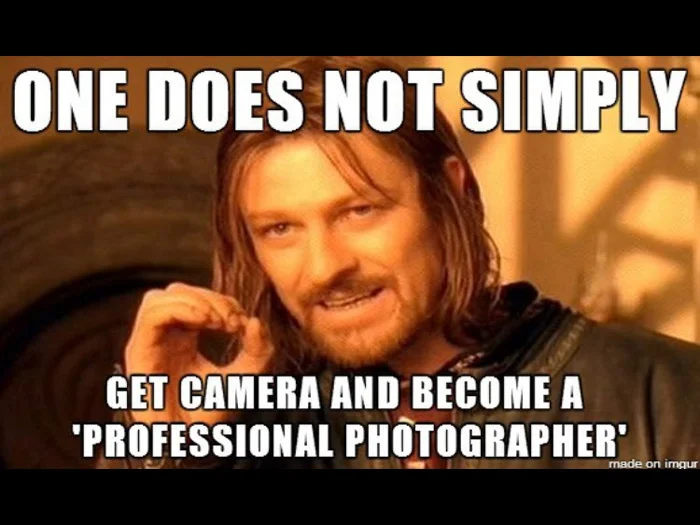
In the ever-evolving world of photography, where creativity knows no bounds, photographers often find themselves bombarded with advice, tips, and suggestions from various sources. While well-intentioned, not all guidance leads to success, and sometimes, following the wrong advice can hinder rather than help one's career. In this blog, we explore the critical aspects of dealing with poor advice in photography, emphasizing the importance of practice, and learning how to evaluate the counsel they receive and the voices they choose to listen to. For photographers looking to hone their craft and make a mark in the industry, discernment is the key to turning setbacks into stepping stones on their creative journey.
Here are various ways in which following misguided advice can negatively impact both your photography business and your overall journey in photography.
Pricing Errors: If a photographer follows advice to set their prices too low, they may struggle to cover their costs and generate a sustainable income. Conversely, setting prices too high based on misguided advice could lead to a lack of clients and missed opportunities.
Ineffective Marketing: Poor advice on marketing strategies can result in wasted resources and efforts. For example, if someone recommends investing heavily in traditional advertising when the target audience is primarily online, it can lead to ineffective marketing campaigns.
Neglecting Client Relationships: Failing to nurture client relationships due to misguided advice can result in fewer repeat clients and referrals. A photographer who neglects follow-up, communication, and customer service may find it challenging to maintain a loyal client base.
Mismanagement of Finances: Poor financial advice can lead to mismanagement of funds, putting a photographer's business at risk. For instance, taking unnecessary loans or not saving for taxes based on incorrect financial advice can lead to financial instability.
Falling for Industry Myths: Misconceptions or myths about the photography industry can lead to poor decision-making. For example, believing that a particular camera or equipment is essential for success, when it's not, can result in unnecessary expenses.
Overlooking Contracts and Legalities: Failing to seek proper legal advice on contracts and rights can lead to disputes with clients or loss of intellectual property. Ignoring the importance of clear, well-drafted contracts can have legal and financial repercussions.
Ignoring Business Planning: Poor advice that discourages the creation of a business plan can leave a photographer without a clear roadmap for their career. Without a plan, it's challenging to set and achieve goals, manage resources effectively, and measure success.
Over-Editing vs. Natural Beauty: Many photographers have been advised to heavily edit their photos to achieve a certain style. However, blindly following this advice can lead to over-processed, unrealistic images that disconnect viewers from the subject's natural beauty. The ability to discern when to apply minimal editing and when to embrace a more natural aesthetic is crucial.
Copying Trends vs. Finding Your Voice: In the age of social media, photographers may feel compelled to replicate popular trends and styles to gain attention. Yet, true success often comes from finding one's unique voice and style, even if it means ignoring advice suggesting otherwise.
Gear Obsession vs. Skill Development: Many novice photographers are advised to invest heavily in the latest camera equipment. While gear is important, it's often more beneficial to focus on honing skills and practicing with the equipment one has. Recognizing the balance between gear and technique is essential.
Chasing Likes vs. Personal Fulfillment: Social media can be a double-edged sword for photographers. Obsessing over likes, comments, and followers can lead to creating work that prioritizes popularity over personal fulfillment. It's important to differentiate between creating for validation and creating for personal satisfaction.
Overloading on Tutorials vs. Practical Experience: With a plethora of online tutorials available, some photographers might become overwhelmed by constantly seeking guidance. While tutorials are valuable, nothing beats hands-on experience. Knowing when to apply lessons from tutorials and when to learn through trial and error is a skill worth developing.
Blindly Following Influencer Advice vs. Critical Evaluation: Listening to photography influencers is common, but blindly following their advice without considering how it fits one's own goals and style can be detrimental. The ability to critically evaluate advice and adapt it to individual needs is a valuable skill.
In the world of photography, where every click of the shutter is a brushstroke on the canvas of our unique journey, the significance of discerning good advice from bad cannot be overstated. In an industry characterized by constant change and innovation, our ability to sift through the wealth of information is pivotal to our growth. To thrive, we must cherish our creative authenticity, nurture our distinctive voice, and embrace evolution through experimentation and learning. As you set forth on your photography adventure, remember to choose your guidance wisely, practice relentlessly, and maintain a steadfast focus on your personal growth and creative evolution. Your journey in photography will flourish as a result, bearing the fruits of your dedication and discernment.
Moment Of Reflection: Can you share some instances of poor advice you've come across in photography, and the decisions you've made to either deviate from or persist with that advice? What were the outcomes or consequences of those choices?
